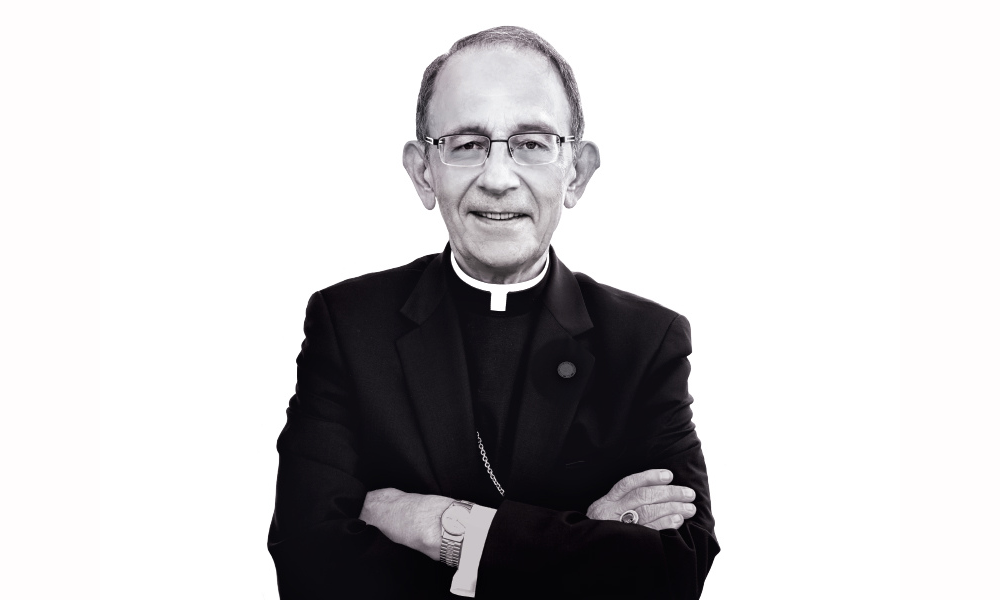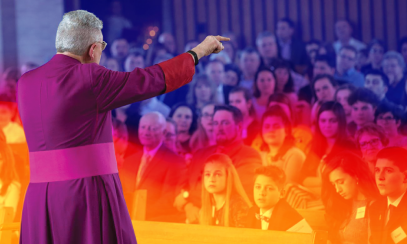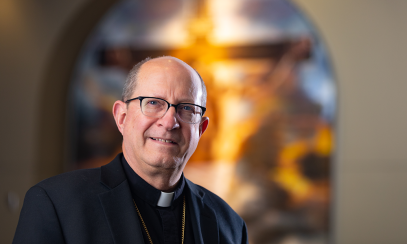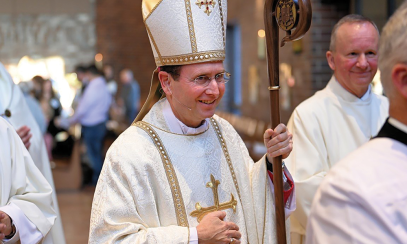
Working Together to Bring About Healing
The Most Rev. Lawrence T. Persico has been bishop of the Diocese of Erie, Pennsylvania, since Oct. 1, 2012. Early on, he was engaged in a five-part pastoral plan regarding parish and school restructuring, vocations, faith formation and the accompanying organizational changes necessary in response to the updates. Even as he took on those all-consuming tasks, he began a series of informal discussions with various advisors about sexual abuse within the church.
“Was it time,” he wanted to know, “to consider releasing the names of people with credible abuse allegations to the public?”
By the time he was served with the subpoena from the 40th Statewide Grand Jury of Pennsylvania to turn over files for its investigation, Bishop Persico already had given the local district attorney complete access to diocesan files. He felt their professional review would be helpful before releasing names. In response to the subpoena, he engaged the Pittsburgh-based K&L Gates law firm not only to represent the diocese, but also to update its Policy for the Protection of Children and to do another complete review of its files.
“It was an important investment for the diocese,” he says. “I don’t know how we could begin building for the future without having a complete understanding of our past.”
Content Evangelist: What considerations did you weigh when deciding how to handle this crisis?
Bishop Lawrence Persico: The guiding principle has been transparency. That’s important for the victims, for the faithful and for the public.
I did not want to take a defensive posture. The details published in the grand jury report were horrifying. Even though the vast majority of it had occurred before the Dallas Charter, I did not begin by pointing out all the good things we’ve done since that time. The emotions of the moment called for me to stand in humility and to apologize for the behavior that had occurred.
My first consideration was the victims. What did they need to hear? What did they need from me?
About four months before the grand jury report was published, our own investigators had completed their review, which we handed over to the attorney general. We decided to release our Public Disclosure List at the same time.
I heard from many victims expressing their gratitude. They felt validated. It’s as though they had been living in a dark room, not knowing there were others in there with them. And suddenly, the light came on and for the first time, they realized they were not alone. It was a step on the road to healing.
Content Evangelist: What led to the decisions you made?
BLP: For years, I was opposed to releasing names. What would the process be? How would we handle those who were dead?
And then I received word that two men whose cases had been sent to Rome before I became bishop had been laicized. One of the men had begun functioning as a minister. So, I decided to release brief statements for parish bulletins and for the media, making it clear these men were no longer allowed to present themselves or to function as Catholic priests.
That experience showed me it was my responsibility to protect the community from being misled. That helped convince me to keep moving forward.
Content Evangelist: How did you and your communications director work together throughout the crisis? What was valuable about that?
BLP: It’s essential to have a communications director you trust. He or she needs to be brought in very early and at the ground level. You can’t turn to someone when you’re in crisis mode and expect them to prepare a message that captures your thinking. Then you’ve put them in a position where they’re scrambling to understand the situation.
Because we work as a team, Anne-Marie [Welsh, director of communications for the Diocese of Erie] understands the big picture. She’s not working in a vacuum.
I prefer to have her ask questions of the attorneys and of me along the way so she can speak and write with integrity. It’s better for her and it’s better for me. I’m not being peppered with 101 questions when we are all under a deadline.
Content Evangelist: How can communications professionals best serve their bishops and dioceses during this crisis?
BLP: We all know things happen very quickly today. Whenever I need to make a statement, I begin by having a conversation with Anne-Marie. We go over the main points I want to emphasize, and then she is able to put together a first draft for me to edit. That’s one way communicators can be of service.
With the abuse crisis, there are sometimes several people at the table. Lawyers have a significant role. It’s been helpful for Anne-Marie to be in on some of those conversations. For too long, the Church has sounded as if it’s on the attack, or sounded legalistic. Fortunately, our lawyers support my desire to take a pastoral approach in our statements. A good writer helps us to do that better.
Communicators obviously need to be on the same page as their bishop. Otherwise, their heart will not be in their work, and that will not serve anyone well.
But when they have a similar approach, communicators need to accept their role and share their honest opinions.
The Church is going to be addressing this crisis for a long time to come. Trust has been seriously fractured. We have much work to do, and we will be judged on our actions more than our words. But the words we choose to keep people informed about our actions will help facilitate the trust we need to rebuild.



